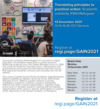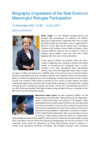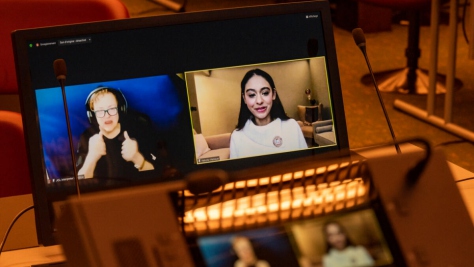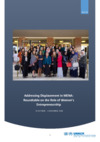Violence in northern Mali forces over 20,000 into exile
This is a summary of what was said by UNHCR spokesperson Adrian Edwards – to whom quoted text may be attributed – at today's press briefing at the Palais des Nations in Geneva.
UNHCR has deployed emergency teams to countries surrounding Mali to help meet the needs of some 20,000 people who have been forced to flee fighting in northern Mali. Most of the displaced are in Niger, Burkina Faso and Mauritania.
Fighting between rebel Tuareg groups and governmental forces in the Azawad region of northern Mali began in mid-January.
In the past three weeks, at least 10,000 people are reported to have crossed to Niger, 9,000 have found refuge in Mauritania and 3,000 in Burkina Faso.
In Niger, most of the new arrivals are from Menaka in Mali. Some have settled very close to the volatile border. Many of the new arrivals are sleeping in the open and have little access to shelter, clean water, health services, and food. People are scattered mainly in villages in Tillaberery, Ouallam, and Filingue districts, in the north of the country. Sinegodar, a village in Tillabery district, is hosting over 5,500 Malians, with one sole water point for the entire refugee and local population.
While most of those who recently fled Mali are Malians, recent arrivals in Niger also include nationals of Niger who had been living in Mali for decades. Many have been crossing the border between the two countries regularly to find grazing land for their cattle.
Local communities along the border, affected by the food crisis themselves in the Sahel, are sharing their resources with the new arrivals. The authorities have also distributed food. Four additional UNHCR staff are already in Niger and more are on their way. We plan to send aid for 10,000 people from our stockpiles in the region.
Our office in Ouagadougou, in Burkina Faso also reported the arrival of some 3,000 Malian Tuaregs following attacks on their homes and businesses in the Malian capital Bamako and in the nearby town of Kati last week. Many of the new arrivals are staying with host families in Ouagadougou and Bobo Dioulasso, 320 kilometres south-west of the capital. Other new arrivals have been reported in the north west of the country, especially near Djibo, in Soum province. An inter-agency mission, including UNHCR, is scheduled to go there by the end of the week to assess the needs of the people.
Meanwhile in Mauritania UNHCR has sent several missions to the village of Fassala, in the region of Hodh el Chargi 3km from the border with Mali, where over 9,000 people have arrived since 25th January. The mainly ethnic Tuareg Malian refugees come from the region of Léré on the other side of the border. They told UNHCR that they fled fighting between Government forces and rebel Tuareg fighters, fearing retaliation by army troops.
The Mauritanian authorities, with the support of UNHCR, are taking care of the new arrivals. Medical services are being offered by the local health clinics and water is being trucked in by the authorities. UNHCR Mauritania distributed 15-day food rations and non food items to cover the urgent needs of 5000 refugees in the refugee site of Fassala. Key needs identified are food, shelter and other basic items. UNHCR will strengthen its presence in Mauritania by fielding an emergency support team.
Fighting between the Tuareg liberation movement MNLA (Mouvement National de Liberation de l'Azawad) and governmental forces resumed on 17 January in Mali, breaking a 2009 agreement that had officially ended the Tuareg rebellion.
For further information on this topic, please contact:
- In Dakar: Helene Caux on mobile +221 77 333 12 91
- In Geneva: Fatoumata Lejeune-Kaba on mobile +41 79 249 3483
- In Geneva: Sybella Wilkes on mobile +41 79 557 9138
Related news and stories
Violence and threats by armed groups continue to displace refugees and civilians in Mali
Escalating violence leaves hundreds dead and hundreds of thousands on the move in eastern DRC
UNHCR urges greater support as violence continues unabated in Burkina Faso
Displaced people from climate frontlines raise their voices at COP27
UN warns of worsening conflict and displacement in Sahel without immediate climate action
UNHCR calls on States to refrain from forced returns of Haitians
-

HLOM side event translating principles to practical action
8 Dec 2021 Event-Flyer: Reflecting progress since the Global Refugee Forum in 2019, this event will examine innovative tools, contributions from governments and academics themselves that help ensure that displaced students, scholars and scientists are not left behind. -

UNHCR outraged as three staff members wounded in attack in eastern Democratic Republic of the Congo
8 Dec 2021 -

HLOM side event meaningful refugee participation list of speakers
8 Dec 2021 Biography of speakers of the Side Event on Meaningful Refugee Participation (HLOM, 13 December 2021) -

Darfur clashes displace thousands
7 Dec 2021 -

Event days
-

Governments pledge over US$1 billion to support UN Refugee Agency's work for 2022
7 Dec 2021 -

Drumming against gender-based violence in Ecuador
7 Dec 2021 Afro-Ecuadorians and Afro-Colombian refugees use traditional arrullo rhythms and song to open a conversation about gender-based violence. -

Compendium - Protection-sensitive access to clean cooking (2021)
7 Dec 2021 This compendium is intended for UNHCR personnel and partners to support programme development in compliance with UNHCR policies and guidance. It outlines a step-by-step approach and a list of options to address cooking challenges when confronted with limited, inappropriate, inefficient local cooking solutions, or the lack of access thereof. -

Addressing Displacement in MENA: Roundtable on the Role of Women's Entrepreneurship
7 Dec 2021 The roundtable was a unique opportunity to provide a platform for women entrepreneurs to frame their role in issues related to displacement in the MENA region and identify innovative livelihood strategies and opportunities for refugee women through women's empowerment and economic participation. It was attended by 40 business women from across MENA and refugees from 5 nationalities and urban community centre.
